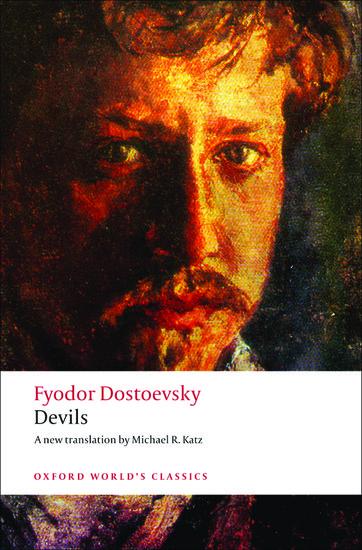
Zustellung: Fr, 18.07. - Mo, 21.07.
Sofort lieferbar
VersandkostenfreiBestellen & in Filiale abholen:
Devils, also known in English as The Possessed and The Demons, was first published in 1871-2. The third of Dostoevsky's five major novels, it is at once a powerful political tract and a profound study of atheism, depicting the disarray which follows the appearance of a band of modish radicals in a small provincial town. Dostoevsky compares infectious radicalism to the devils that drove the Gadarene swine over the precipice in his vision of
a society possessed by demonic creatures that produce devastating delusions of rationality.
Dostoevsky is at his most imaginatively humorous in Devils: the novel is full of buffoonery and grotesque comedy. The plot is loosely based on the details of a notorious case of political murder, but Dostoevsky weaves suicide, rape, and a multiplicity of scandals into a compelling story of political evil.
This new translation also includes the chapter `Stavrogin's Confession', which was initially considered to be too shocking to print. In this edition it appears where the author originally intended it.
a society possessed by demonic creatures that produce devastating delusions of rationality.
Dostoevsky is at his most imaginatively humorous in Devils: the novel is full of buffoonery and grotesque comedy. The plot is loosely based on the details of a notorious case of political murder, but Dostoevsky weaves suicide, rape, and a multiplicity of scandals into a compelling story of political evil.
This new translation also includes the chapter `Stavrogin's Confession', which was initially considered to be too shocking to print. In this edition it appears where the author originally intended it.
The third of Dostoevsky's five major novels, Devils (1871-2), also known as The Possessed, is at once a powerful political tract and a profound study of atheism, depicting the disarray that follows the appearance of a band of modish radicals in a small provincial town. This new translation includes the chapter "Stavrogin's confession," initially censored by Dostoevsky's publisher.
Produktdetails
Erscheinungsdatum
15. Juli 2008
Sprache
englisch
Seitenanzahl
800
Reihe
Oxford World's Classics
Autor/Autorin
Fyodor Dostoevsky, Fjodor Michailowitsch Dostojewski
Herausgegeben von
Michael R Katz
Übersetzung
Michael R Katz
Verlag/Hersteller
Produktart
kartoniert
Gewicht
544 g
Größe (L/B/H)
191/127/38 mm
ISBN
9780199540495
Entdecken Sie mehr
Bewertungen
0 Bewertungen
Es wurden noch keine Bewertungen abgegeben. Schreiben Sie die erste Bewertung zu "Devils" und helfen Sie damit anderen bei der Kaufentscheidung.









